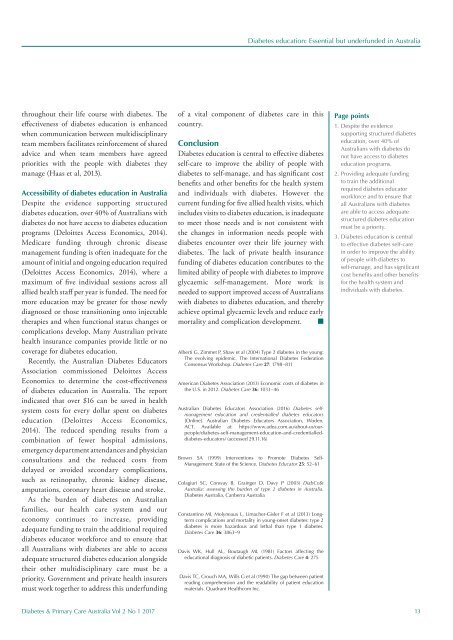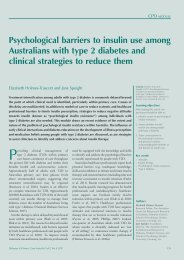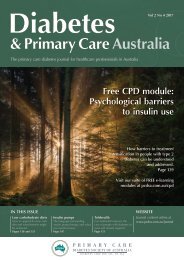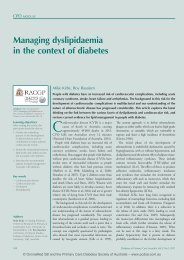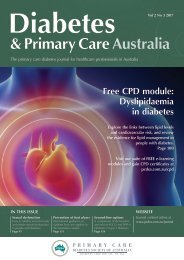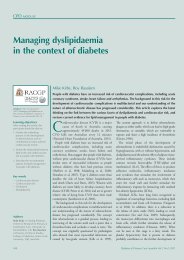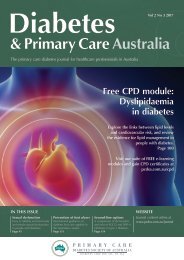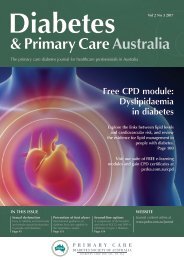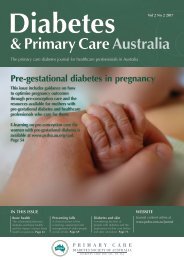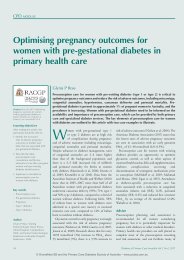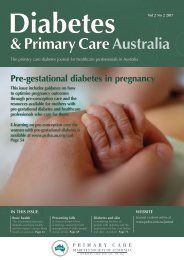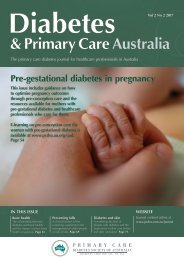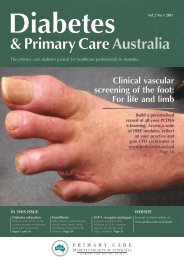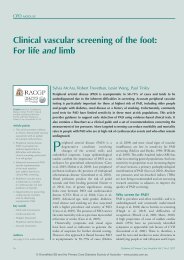DPCA2-1
Create successful ePaper yourself
Turn your PDF publications into a flip-book with our unique Google optimized e-Paper software.
Diabetes education: Essential but underfunded in Australia<br />
throughout their life course with diabetes. The<br />
effectiveness of diabetes education is enhanced<br />
when communication between multidisciplinary<br />
team members facilitates reinforcement of shared<br />
advice and when team members have agreed<br />
priorities with the people with diabetes they<br />
manage (Haas et al, 2013).<br />
Accessibility of diabetes education in Australia<br />
Despite the evidence supporting structured<br />
diabetes education, over 40% of Australians with<br />
diabetes do not have access to diabetes education<br />
programs (Deloittes Access Economics, 2014).<br />
Medicare funding through chronic disease<br />
management funding is often inadequate for the<br />
amount of initial and ongoing education required<br />
(Deloittes Access Economics, 2014), where a<br />
maximum of five individual sessions across all<br />
allied health staff per year is funded. The need for<br />
more education may be greater for those newly<br />
diagnosed or those transitioning onto injectable<br />
therapies and when functional status changes or<br />
complications develop. Many Australian private<br />
health insurance companies provide little or no<br />
coverage for diabetes education.<br />
Recently, the Australian Diabetes Educators<br />
Association commissioned Deloittes Access<br />
Economics to determine the cost-effectiveness<br />
of diabetes education in Australia. The report<br />
indicated that over $16 can be saved in health<br />
system costs for every dollar spent on diabetes<br />
education (Deloittes Access Economics,<br />
2014). The reduced spending results from a<br />
combination of fewer hospital admissions,<br />
emergency department attendances and physician<br />
consultations and the reduced costs from<br />
delayed or avoided secondary complications,<br />
such as retinopathy, chronic kidney disease,<br />
amputations, coronary heart disease and stroke.<br />
As the burden of diabetes on Australian<br />
families, our health care system and our<br />
economy continues to increase, providing<br />
adequate funding to train the additional required<br />
diabetes educator workforce and to ensure that<br />
all Australians with diabetes are able to access<br />
adequate structured diabetes education alongside<br />
their other multidisciplinary care must be a<br />
priority. Government and private health insurers<br />
must work together to address this underfunding<br />
of a vital component of diabetes care in this<br />
country.<br />
Conclusion<br />
Diabetes education is central to effective diabetes<br />
self-care to improve the ability of people with<br />
diabetes to self-manage, and has significant cost<br />
benefits and other benefits for the health system<br />
and individuals with diabetes. However the<br />
current funding for five allied health visits, which<br />
includes visits to diabetes education, is inadequate<br />
to meet those needs and is not consistent with<br />
the changes in information needs people with<br />
diabetes encounter over their life journey with<br />
diabetes. The lack of private health insurance<br />
funding of diabetes education contributes to the<br />
limited ability of people with diabetes to improve<br />
glycaemic self-management. More work is<br />
needed to support improved access of Australians<br />
with diabetes to diabetes education, and thereby<br />
achieve optimal glycaemic levels and reduce early<br />
mortality and complication development. n<br />
<br />
Alberti G, Zimmet P, Shaw et al (2004) Type 2 diabetes in the young:<br />
The evolving epidemic. The International Diabetes Federation<br />
Consensus Workshop. Diabetes Care 27: 1798–811<br />
American Diabetes Association (2013) Economic costs of diabetes in<br />
the U.S. in 2012. Diabetes Care 36: 1033–46<br />
Australian Diabetes Educators Association (2016) Diabetes selfmanagement<br />
education and credentialled diabetes educators<br />
[Online]. Australian Diabetes Educators Association, Woden,<br />
ACT. Available at: https://www.adea.com.au/about-us/ourpeople/diabetes-self-management-education-and-credentialleddiabetes-educators/<br />
(accessed 29.11.16)<br />
Brown SA (1999) Interventions to Promote Diabetes Self-<br />
Management: State of the Science. Diabetes Educator 25: 52–61<br />
Colagiuri SC, Conway B, Grainger D, Davy P (2003) DiabCo$t<br />
Australia: assessing the burden of type 2 diabetes in Australia.<br />
Diabetes Australia, Canberra Australia<br />
Constantino MI, Molyneaux L, Limacher-Gisler F et al (2013) Longterm<br />
complications and mortality in young-onset diabetes: type 2<br />
diabetes is more hazardous and lethal than type 1 diabetes.<br />
Diabetes Care 36: 3863–9<br />
Davis WK, Hull AL, Boutaugh ML (1981) Factors affecting the<br />
educational diagnosis of diabetic patients. Diabetes Care 4: 275<br />
Davis TC, Crouch MA, Wills G et al (1990) The gap between patient<br />
reading comprehension and the readability of patient education<br />
materials. Quadrant Healthcom Inc.<br />
Page points<br />
1. Despite the evidence<br />
supporting structured diabetes<br />
education, over 40% of<br />
Australians with diabetes do<br />
not have access to diabetes<br />
education programs.<br />
2. Providing adequate funding<br />
to train the additional<br />
required diabetes educator<br />
workforce and to ensure that<br />
all Australians with diabetes<br />
are able to access adequate<br />
structured diabetes education<br />
must be a priority.<br />
3. Diabetes education is central<br />
to effective diabetes self-care<br />
in order to improve the ability<br />
of people with diabetes to<br />
self-manage, and has significant<br />
cost benefits and other benefits<br />
for the health system and<br />
individuals with diabetes.<br />
Diabetes & Primary Care Australia Vol 2 No 1 2017 13


